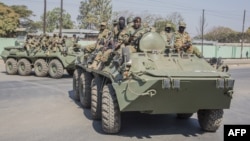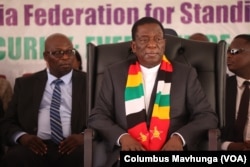The head of U.S. Africa Command denied Thursday claims by Zimbabwean government officials that Washington is setting up a military base in neighboring Zambia and wants to move AFRICOM operations there from Germany.
At an online press briefing, General Michael Langley, head of AFRICOM, rejected Zimbabwe’s claims that the United States is establishing a base in neighboring Zambia.
“That's absolutely false,” Langley said from an African Chiefs of Defense Conference in Botswana. “We have no bases in Zambia. We have no plans to put one there.”
He said the U.S.’s approach on the continent is “African-led and U.S.-enabled.”
“We have a deep partnership with Zambia,” he said. “We have increased security cooperation with them. But there is no footprint. There's no posture. There's no base.”
Zimbabwean officials declined to comment to VOA about Langley’s remarks. But Rutendo Matinyarare, chairperson of the pro-government Zimbabwe Anti-Sanctions Movement, alleged that Langley held a briefing in Lusaka and that the U.S. was setting up the AFRICOM hub in Zambia.
Matinyarare claimed that several businesspeople who have flown into the country have seen a substantial amount of American military equipment at Zambia’s airport.
“And so, the question is, ‘What are these weapons doing in Zambia?’” he said.
Zambian President Hakainde Hichilema denies that his country is being militarized by the U.S. He says Zambia’s army has exchange programs with a number of countries, including the U.S., which should not be mistaken for the U.S. establishing a base.
Zambia says it has called on two regional bodies — the African Union and the Southern African Development Community — to mediate talks with Zimbabwe. Zambia and Zimbabwe are members of both organizations.
Zambian officials have also said the fallout stems from comments that Zimbabwean President Emerson Mnangagwa made during a recent trip to Russia — namely, the accusation that the U.S. has been militarizing Zambia to consolidate power in the region and isolate Zimbabwe.
Western countries imposed travel and financial sanctions on Zimbabwe’s leadership and affiliated companies in the early 2000s for alleged election rigging and human rights abuses. The U.S. recently removed sanctions on most Zimbabweans, but a few prominent figures — including Mnangagwa — remain on the list.
Meanwhile, Langley told reporters that top regional security challenges throughout Africa were discussed at the just-ended defense conference.
“Our African partners want this conference here because they want to own it. But we are AFRICOM, and the U.S. government is here because we have common values, common objectives, that will affect stability, security and prosperity on the continent,” he said.
This year’s conference provided a “valuable wealth of information” and lessons ahead of talks next year, Langley said.





